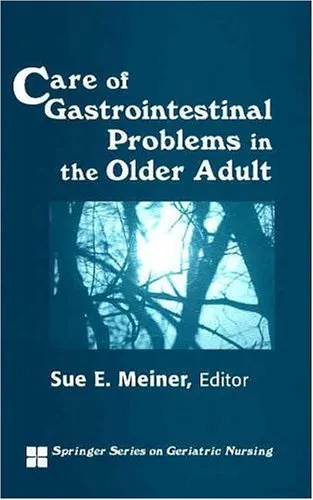Care of Gastrointestinal Problems in the Older Adult (Springer Series on Geriatric Nursing)
4.6
Reviews from our users

You Can Ask your questions from this book's AI after Login
Each download or ask from book AI costs 2 points. To earn more free points, please visit the Points Guide Page and complete some valuable actions.Introduction to "Care of Gastrointestinal Problems in the Older Adult"
The aging population is growing globally, leading to a significant increase in healthcare challenges specific to older adults. Among these, gastrointestinal (GI) problems stand out as both common and complex. "Care of Gastrointestinal Problems in the Older Adult," part of the Springer Series on Geriatric Nursing, delves deeply into diagnosing, managing, and caring strategies for GI issues affecting elderly populations. This book serves as an essential resource for nurses, geriatricians, and other healthcare professionals dedicated to elder care.
Authored by Sue E. Meiner, an experienced nurse practitioner and educator, this text expertly bridges the gap between nuanced medical science and practical caregiving. With a focus on evidence-based methodologies, it provides a comprehensive guide to improving patient outcomes while being sensitive to the unique physiological and psychosocial factors impacting older adults.
The book not only highlights the medical aspects of gastrointestinal problems but also underscores the importance of patient-centered care. It offers practical strategies, case studies, and actionable insights that empower healthcare providers to confidently manage the full spectrum of GI concerns in their elderly patients.
Detailed Summary of the Book
This book is meticulously organized into sections that progressively expand on the biological, clinical, and nursing perspectives of gastrointestinal care in the aging population.
It begins with an insightful overview of the aging process and how natural physiological changes in the gastrointestinal system contribute to disease presentation in older adults. By explaining these critical changes, the book equips readers to discern between age-related variations and pathological conditions.
Subsequent chapters tackle specific GI problems such as dysphagia, constipation, diarrhea, malnutrition, gastrointestinal bleeding, and cancer of the GI tract. Each condition is explored in-depth, with clear explanations of its pathophysiology, diagnostic criteria, and treatment strategies. The book also dives into the challenges associated with polypharmacy and the importance of tailoring interventions to the older patient’s unique needs.
Further sections emphasize the psychosocial dimensions of care, including patient education, nutritional support, caregiver involvement, and the emotional impact chronic or acute GI conditions may have on older adults. Case studies scattered throughout the text make these concepts real and provide excellent guidance for clinical practice.
The closing chapters focus on emerging research, technological advancements, and the need for interdisciplinary collaboration in managing gastrointestinal problems in older populations. This comprehensive approach ensures readers come away with both practical tools for immediate application and an appreciation for the broader scope of care.
Key Takeaways
- Understanding how aging affects the GI system and differentiating between normal changes and pathological conditions.
- Comprehensive knowledge of common GI issues in older adults, including diagnostic and therapeutic approaches.
- Practical strategies for managing conditions like malnutrition, constipation, and GI bleeding.
- Insights into the importance of psychosocial care and patient education in improving outcomes.
- Interdisciplinary approaches to care that align with current evidence-based practices.
Famous Quotes from the Book
"The gastrointestinal system does far more than process food—it is a critical hub for overall health, and its proper functioning in older adults is key to maintaining a good quality of life."
"Holistic care for gastrointestinal issues requires a blend of medical expertise, empathy, and a relentless focus on each individual’s unique needs."
Why This Book Matters
The rising number of older adults in the global population necessitates a paradigm shift in healthcare practices. GI problems in this demographic are often underdiagnosed, misunderstood, or inadequately managed due to a lack of specialized knowledge. This book addresses that knowledge gap comprehensively, ensuring that healthcare providers are well-equipped to meet the needs of their aging patients.
The emphasis placed on combining evidence-based practices with compassion and a patient-centered approach is what makes this book stand out. It not only improves clinical acumen but also fosters a deeper understanding of the patient experience. "Care of Gastrointestinal Problems in the Older Adult" is not just a text for healthcare professionals—it is a tool for creating positive, life-changing impacts on the lives of older adults and their families.
Free Direct Download
Get Free Access to Download this and other Thousands of Books (Join Now)


